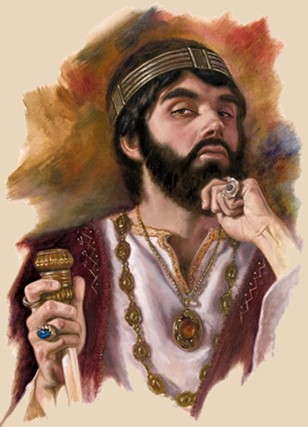
It’s possible that Rehoboam, the fourth king of ancient Israel, never saw it coming.
Who knew that the outcome of his entire reign would come down to one defining moment?
Rehoboam came to the throne upon the death of his father Solomon. As told in I Kings 12, the people of Israel approach him with a demand: “Your father put a heavy yoke on us, but now lighten the harsh labor and the heavy yoke he put on us, and we will serve you.”
Is the crowd raising a legitimate complaint? Apparently so. Solomon had worked his own people like slaves. Resentment is still festering.
So this is Rehoboam’s opportunity to define his approach to leadership. What kind of ruler will the new king choose to be?
His first move is to stall for more time: “Go away for three days and then come back to me.” The king decides to consult the elders who had faithfully served his father. “How would you advise me to answer these people?” You get the feeling these elders are thrilled to be asked. “If today you will be a servant to these people and serve them and give them a favorable answer, they will always be your servants.”
Note that the word “servant” appears twice in their counsel. You be aservant to them, and they will be servants to you.
That’s the essence of servant leadership. Jesus was modeling it when he said, “The Son of Man did not come to be served, but to serve, and to give his life as a ransom for many” (Mark 10:45).
Given the choice, we’d all love to be managed by a servant leader.
A servant leader pays close attention to what we need; intentionally invests in our personal development; credits us when our new ideas move things forward; honors us with public thanks and a generous share of the rewards. Servant leadership isn’t a means of manipulating people – being good to others so they will be good to us in return. A servant leader’s bottom line is to serve people for their own sake. The elders of Israel know that if these civilians are treated well, they will almost certainly choose to be loyal subjects.
But Rehoboam flunks Servant Leadership 101. He chooses to consult with “the young men who had grown up with him and were serving him. ‘What is your advice? How should we answer these people?’”
Who exactly are these guys? They appear to be Rehoboam’s frat brothers. They are his entourage, the young men who haven’t yet had to get a real job, because their job has always been to ensure that Solomon’s number one son feels great about himself. They are his Yes Men.
They answer, “Tell these people who have said to you, ‘Your father put a heavy yoke on us, but make our yoke lighter’ – tell them, ‘My little finger is thicker than my father’s waist. My father laid on you a heavy yoke; I will make it even heavier.”
Now, that’s how to throw your weight around. If they don’t like it you just tell them, “Keep up that crying and I’ll give you something to really cry about.”
Rehoboam the immature leader concludes, “It’s good to be the king.” He chooses not to serve the people. And the nation of Israel comes undone, tragically cleaving into rival kingdoms that will never reconcile.
Our defining moments can be more redemptive. We can be servant parents. Servant neighbors. Servant co-workers.
If you’ve ever wondered how you might make a positive difference over the course of the next 24 hours, choosing to serve the people you meet today is a splendid place to start.
